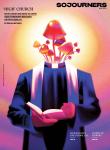Many people encountered Joy Oladokun for the first time in January of 2021 as her voice rang out across the Emmy-winning TV show This Is Us.
Onscreen, as a Black woman grappled with losing her son due to her incarceration, Oladokun’s piano ballad “breathe again” played in the background. “Am I looking for revival?” Oladokun sang. “Am I dressed in other’s sin?”
Oladokun’s songwriting helped provide catharsis for the more than 4 million viewers in that heartbreaking moment. Oladokun is a Black Christian lesbian singer-songwriter who uses “she” and “they” pronouns; reaching all kinds of people across the full breadth of their emotional experience is central to their mission in music.
Oladokun grew up playing in the worship band at their church and began their college career studying worship arts. As they realized that they would not be able to “make peace” with their sexuality and hold a leadership space in a church, they switched their major to English.
Oladokun also stopped playing music in churches, telling Sojourners in February that “the scope of the spiritual is very small in Christian music.” They felt dissonance between the narrow expressions of the human experience allowed in worship music and preaching that said God cares about our whole lives, “from the moment you wake up to when you go to sleep, and even through your dreams.”
“We wouldn’t sing songs about how to take care of each other in relationships or how to hold yourself accountable or how to want better for the world. We would just sing songs about an after party in the sky,” they said. “I think there’s space for that, but it was so incongruent with the message that the spiritual is all-encompassing.”
Oladokun hopes that people find the “full spectrum” of images of God and the divine in her music, just like David’s spectrum of emotions in the Psalms. That spectrum might sometimes eclipse rigid faith boundaries and isn’t explicitly evangelistic, which she embraces.
“I know it goes against what we learned at Dare 2 Share, but just because I’m a Christian doesn’t mean everyone else has to be,” she said with a laugh.
In defense of their own happiness
Oladokun’s relationship with God has the complexity of any other close relationship: There are “ebbs and flows and peaks and valleys,” Oladokun said.
They wrote their song “jordan,” which closes their album in defense of my own happiness with guitars and vocal melodies that roll like waves, while they were coming out. Instead of the “good Lord” of Christians who “tied the shackles to (their) feet” and “drowned (them) in the Jordan,” Oladokun sings of a God who blesses “the work of our hands,” as she and her partner build their love.
Oladokun’s “i see america,” a groovy song from the same album, finds solace in a God who is “darker than the preachers say, with a teardrop tattooed on his face and dirt on his fingers.”
“When I see you, I see love, I see America,” Oladokun proclaims.
But sometimes their relationship with God is more challenging.
“There are parts of the album where God is this scary figure that I feel like has something out for me, and I’m sort of begging for mercy or understanding,” Oladokun said.
In “let it be me,” Oladokun writes about their relationship with their dad, “who grew up in a very homophobic country and has done such amazing work as a human to be able to embrace my partner and I and actually celebrate me as a queer person,” Oladokun said.
Oladokun begins the song, “I grew up scared of my father,” and describes how he “cursed the television and that god damn rainbow parade.” By later verses, she sings, “What was once out of the question, now gets met a quarter way. It might not be a rainbow, but at least it’s more than grey.”
Oladokun also expresses their despair while trying to understand God’s place amid the racist police violence exerted against Black people. As Oladokun sings of their fear of traffic stops in “Who Do I Turn To?” she asks, “If I can’t turn to God, and I can’t turn to you, who do I turn to?”
Oladokun told Sojourners that they wrote “Who Do I Turn To?” the same week that George Floyd was murdered. Oladokun was frustrated with the white evangelicals who told her that she can’t hold God responsible for police violence against the Black community, while simultaneously refusing to examine white evangelical complicity in police violence.
New paths to faith
Oladokun said they have become increasingly aware that many churches are “just clubs [of people] who believe what we believe.” While Oladokun still sees a role for churches and has been attending a church livestream during the pandemic, she said she would never again tell someone they have to go to church every Sunday.
“I think that church as we knew it growing up is over because too many of those institutions have hidden barriers to entry,” Oladokun said. “I think that what will thrive are small communities sustainably practicing what they preach and actively changing themselves and the community.”
For Oladokun, “there is something really holy about being able to connect with people” over meals, good books, hard conversations, or karaoke. This vast understanding of holy connection resonated throughout in defense of my own happiness. Oladokun helps her listeners find God in the beautiful moments and the hard ones too.
Regardless of her changing relationship with church, Oladokun’s faith remains very important to her. “My girlfriend caught me hugging my Bible,” she said jokingly.
As she was grappling with coming out, Oladokun turned to Exodus 20:21, which says, “The people stood at a distance, while Moses drew near to the thick darkness where God was.”
“Sometimes what people perceive to be darkness is actually where you find the voice of God and where you find the voice of truth,” they said.
That biblical understanding guided Oladokun to expressing their sexuality. “As scary as it was for my mom and dad,” said Oladokun, whose parents are Nigerian immigrants, “coming out of the closet was probably the best thing I did for my heart and my faith and my health.”
Oladokun has wanted to reflect the joy of that decision in their songwriting. “I don’t think we talk enough about the delight in sexuality, especially spiritually,” they told Sojourners. They also take inspiration from the spirit of the Last Supper, comparing queer love to communion and noting “there’s something kind of romantic about Jesus at a candle-lit dinner with a bunch of his bros being like, ‘I am this bread. I am this wine. I am what you can feed off of in this moment.’”
In “brick by brick,” a folky love song with gospel choir backup, Oladokun sings, “Drunk on wine, we are bread. We break our bodies in bed. And we are searching for the difference between the ones that we left, and all the love gone unchanged. We are making all things new again, brick by brick.”
Oladokun said they are drawn to comparing the eucharist to romance because both are holy encounters.
“In my experiences with romance and physical affection, I feel the same sharing of self,” they said. “I think God gives a shit about sex too.”
Oladokun also experiences God at the weekly Shabbat dinner they host with their Jewish partner.
“I find just having people in my home — making sure they’re fed and happy and getting to connect and enjoy each other — that is really, really spiritual to me,” they said.
Future work
Oladokun said that her “next body of work is about the human will to keep trying in the midst of all the tragedy that we’ve seen and perpetrated.” And in May they launched “Light on Radio,” a show on Apple Music Country.
“Purple Haze,” the title of her latest single about the power of love as the world burns, will also serve as the name of her tour in September, where she will be supported by another queer Christian artist — Semler.
Oladokun hopes her work will reach a wide, boundary-breaking audience. It’s for Christians and non-Christians, for the people on the margins and the “middle-aged white men with wives and facial hair” who, Oladokun said, bear the cross of masculinity. But she makes her music with “love and joy,” pursuing her “vision of just wanting to help.”
Oladokun’s vulnerability allows listeners to take a minute or an hour to be soft and sit with the divine, before readjusting to face the world.
“I’m essentially still a worship leader.” Oladokun admits, “I just can’t work in any churches.”
Got something to say about what you're reading? We value your feedback!








